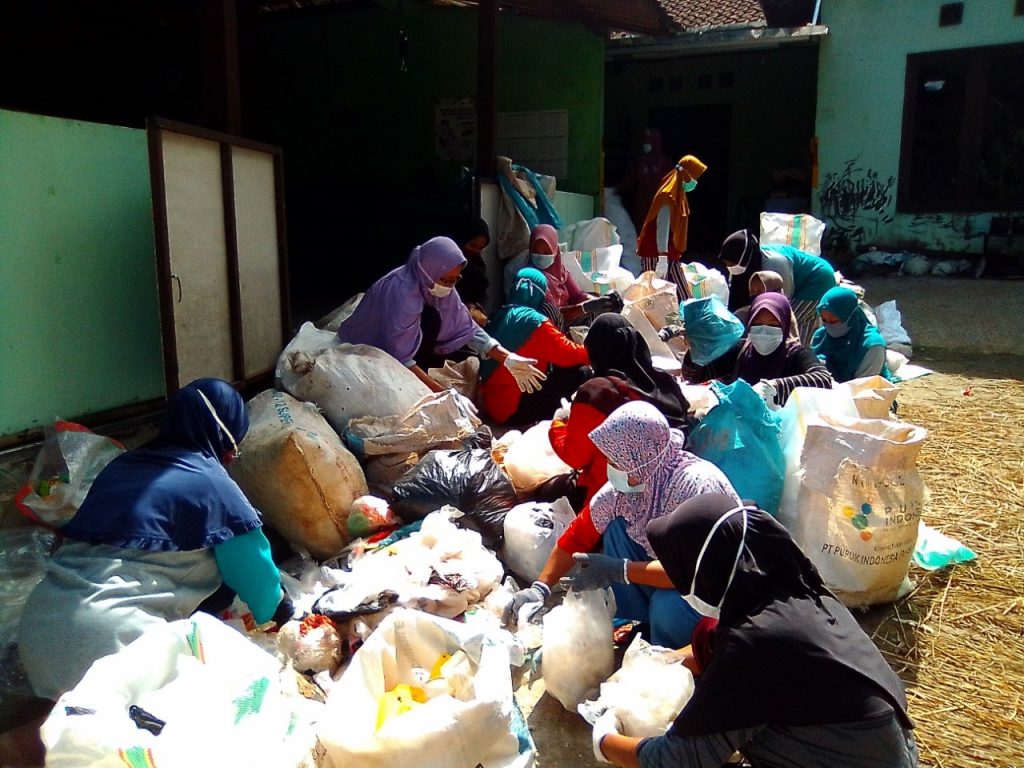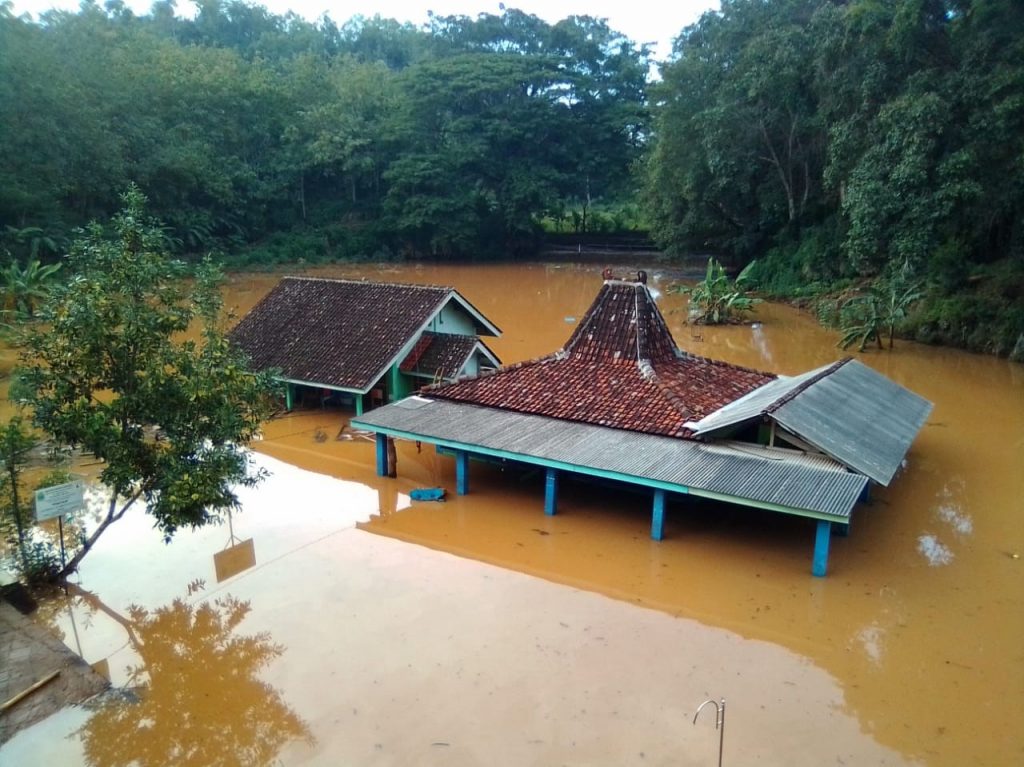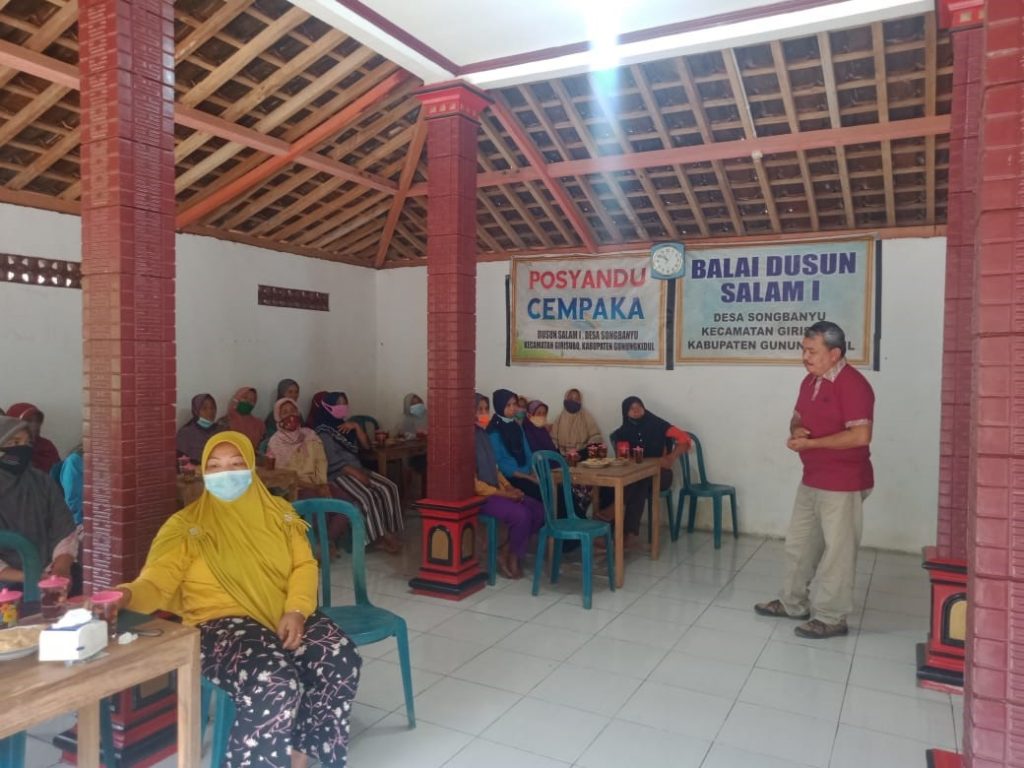
A lesson from a resident of Songbanyu Village in Indonesia.
Mr. Supardi still remembered his out of town trip in late January 2021 when he suddenly got a phone call about flooding in his village. The call shocked him, “flood was an unusual disaster in Songbanyu for the last few years.” He witnessed how the sudden flood had damaged bridges, farmlands, and houses. The villagers’ homes were flooded when he arrived.

The typical feature of the rapid drainage capacity in the Songbanyu’s karst mountains made this flood incident unprecedented. It turned out that many ‘luweng’, the natural ground cavities that become the karst mountains’ drainage system, were clogged. Mr. Supardi and his team discovered that the drainages did not function well. One of the blockages was caused by a pile of domestic waste.
Songbanyu Village is the remotest village in Wonosari, an administrative centre of Gunung Kidul Regency. Songbanyu Village received limited district government programs for flood mitigation, including waste management education and facilities, due to its remoteness. Consequently, waste management in Songbanyu was lacking. Many villagers were still used to littering and burning the garbages.
Songbanyu’s waste problems and the emerging derivative impacts of climate change became priority issues in the focus group discussion of the Village Climate Change Adaptation Action Plan. The urgency of waste management has gained momentum due to the floods. In light of the problem, Mr. Supardi was driven to act. The question is, what can resolve Songbanyu’s waste problem?
Mr. Supardi, a resident of Songbanyu, was determined to improve his village’s waste management. He was the Head of the Village Disaster Preparedness Group. Because of his dedication, he was again entrusted to be the Head of the Working Group for the Inclusive Climate Change Adaptation Program. Nevertheless, changing the perspective and behaviour of Songbanyu’s residents in waste management was somehow challenging. He explained, “At first, many people doubted the waste bank approach. There was a perception in our community that the term ‘bank’ always refers to ‘much money’.”
Thanks to Mr. Supardi’s persistent efforts and influence, most of the Songbanyu community no longer continues their habit of littering and burning garbage. Within the last five months, 250 community members in 4 hamlets (dukuh), who previously did not manage their waste, started to utilise the Waste Bank. With Bintari’s Inclusive Climate Change Adaptation Program, Mr. Supardi tirelessly educates and supports the residents in better managing waste. He also receives support from the village officials who directly inform the community or are actively involved as Waste Bank administrators.
After initial training at the village was carried out by Bintari Waste Management Facilitator in October 2020, Mr. Supardi extended the activity at the hamlet (dukuh) level. Dukuh Songbanyu 1 was the first hamlet to receive training in December 2020, followed by the establishment of Songbanyu 1 Waste Bank Unit. After the floods, continuous education and establishment of Waste Bank Units were increasingly carried out in four other hamlets. Dukuh Bandung, Gabugan 1, Gabugan 2 and Salam 1 were following the steps of Dukuh Songbanyu 1 to develop a Waste Bank Unit and better waste management.

In March 2021, Mr. Supardi assisted the Songbanyu 1 Waste Bank Unit in making the first waste savings deposit. In almost three months, the residents got the opportunity to sort and collect an adequate volume of waste. They collected inorganic waste with economic value, including PET (polyethylene terephthalate) bottles, cardboards, glass bottles and plastic bags. The waste deposit’s volume and price were recorded as ‘savings’ for each Waste Bank ‘customer’. This savings is managed in the Waste Bank and can be withdrawn by the customer at any time.
Mr. Supardi is not quickly satisfied with this achievement. He plans to scale up the waste banks. He enthusiastically mentioned, “last week, waste bank workshops were conducted in two other hamlets.” He continued, “other remaining hamlets have also requested waste education workshop, but the activity had to be postponed due to the lockdown.” His motivation to increase the environmental awareness in Songbanyu Village has led him to work harder.
“A good waste bank management will contribute to resolving waste problems which constantly get more worrying. From a health perspective, it will help us overcome the negative impact of waste. Besides, speaking of economic value, it will also support a small part of our material necessity, especially from the household waste sales.” – Mr. Supardi
This progress receives positive responses from the community and the village government. Mr. Supardi is even surprised that many villagers, who did not care about waste management, now want to be involved as the waste bank management administrator.
Songbanyu residents have become more aware of the benefits of Waste Bank as a model of climate change adaptation. Waste management can prevent floods caused by natural drainage blockages in the karst area. It will also improve village aesthetics and prevent vector-borne diseases. The previously overlooked economic benefit of waste also financially contributes to the community income. The Waste Bank initiatives in Songbanyu have proven strong local leadership and capacity in strengthening community resilience to face the climate crisis.
—
About Our Project
The Waste Bank development is one of the climate resilience actions implemented by the project “Improving adaptation capacities of at-risk coastal communities in Indonesia and the Philippines through inclusive community-based actions and learnings”. This project is a partnership between ACCORD Inc., ASB Indonesia and the Philippines, and Bintari Foundation, with funding from Germany’s Federal Ministry for Economic Cooperation and Development (BMZ). This project aims to reach 18.420 community members to build 6 climate-resilient communities in Indonesia. It becomes a part of the mandatory national “Climate Village” Program, which seeks to build climate resilience of the village communities across Indonesia.

